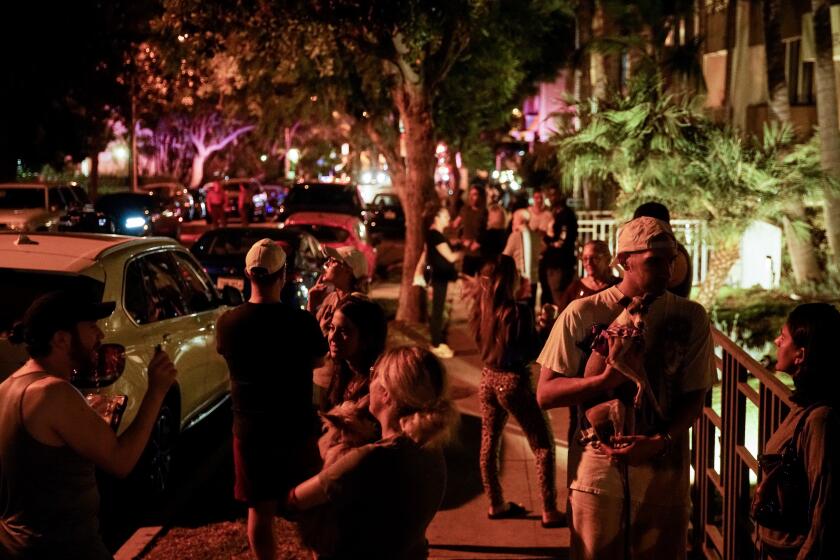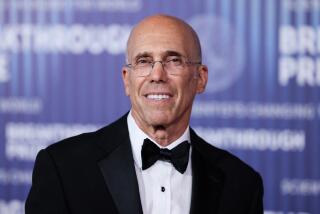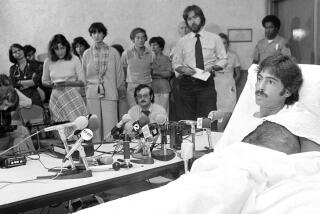Homeless men called Democratic donor Ed Buck ‘Dr. Kevorkian.’ Why did his arrest take so long?

- Share via
Stunning new allegations that Democratic donor Ed Buck paid at least 10 men to use drugs for his pleasure have sparked more questions from activists and others about why it took so long to uncover the longtime West Hollywood political activist’s alleged misconduct.
Buck has been the subject of protests and demands for justice since 2017, when a young man was found dead in his home of a drug overdose. Early this year, a second man was found dead inside Buck’s West Hollywood apartment.
Community activists and family and friends of the victims have long questioned whether Buck’s political connections played a role in the lack of law enforcement action after the first death — an accusation authorities deny.
In 2010, then-California gubernatorial candidate Meg Whitman was holding a political rally at a Hollywood hotel when from the front row a man started heckling her.
Jasmyne Cannick, who has led community protests about Buck, said she was pleased with his arrest this week but said it took far too long.
“We brought them plenty of witnesses,” Cannick said. “Over the years, I met with victims repeatedly. They didn’t want to be out in the open. One of them is now dead, and sadly he didn’t get to see this day.”
The mother of Gemmel Moore, the man found dead in Buck’s home in 2017, thanked her son’s supporters for not giving up. In a video statement posted on Twitter, LaTisha Nixon said she felt like prosecutors initially treated her like a criminal when she pressed her case.
Prosecutors call Ed Buck, who was arrested this week, a violent sexual predator who preyed on men struggling with addiction and homelessness.
“I am happy. I knew this day was going to come,” she said.
A 22-page federal criminal complaint unsealed Thursday painted a depraved picture of how Buck earned the grim sobriquet of “Dr. Kevorkian” among the homeless men in West Hollywood’s Plummer Park, less than a mile from Buck’s home.
Ten men told investigators that Buck had paid them to use drugs and dress in skimpy underwear for his own sexual pleasure. Several of the men claimed they lost consciousness after Buck served them a drink, and some said they woke up to the sight of him injecting drugs into their arms against their will, according to the complaint.
Buck was charged Thursday with one count of distributing methamphetamine leading to a death, according to the U.S. attorney’s office in Los Angeles. The announcement ended a two-year saga that had circled around Buck, local law enforcement leaders and activists from the city’s African American and LGBTQ communities, many of whom alleged Buck had been ducking justice since Moore’s 2017 overdose death.
Los Angeles County prosecutors charged Buck earlier this week with operating a drug house, but the federal charge could prove far more serious. If convicted of providing the drugs that led to Moore’s death, Buck faces a minimum of 20 years in prison.
Buck made a brief appearance in federal court Thursday afternoon and was ordered held without bail. Calls to his attorney seeking comment were not returned.
Buck was arrested at his West Hollywood home Tuesday night, less than a week after a man fled Buck’s home fearing he was suffering a methamphetamine overdose, prosecutors allege.
Buck tried to prevent the man from getting medical attention, authorities said. The man was able to get to a gas station and call 911 after the Sept. 11 incident, which investigators have said was key to bringing charges against Buck.
“The surviving victim’s statements gave us the break we needed,” said Los Angeles County Dist. Atty. Jackie Lacey, whose office has been the subject of withering criticism for choosing not to prosecute Buck in the past.
Buck’s behavior first came under scrutiny in July 2017 after Moore, who had been homeless and sometimes worked as an escort, died of a methamphetamine overdose. Investigators initially ruled his death accidental, but activists and Moore’s family quickly challenged that determination. In a journal found among Moore’s possessions, the 26-year-old Texas man blamed Buck for his drug addiction.
“I’ve become addicted to drugs and the worst one at that,” the journal said. “Ed Buck is the one to thank, he gave me my first injection of chrystal meth.”
The Los Angeles County Sheriff’s Department revisited the case, and in 2018, investigators asked prosecutors to consider four charges in Moore’s death: murder, voluntary manslaughter, and furnishing and possessing drugs. Lacey declined to file a case, citing insufficient evidence.
When a second man — Timothy Dean, 55 — died of an overdose in Buck’s apartment in January, the Sheriff’s Department said it would take another look at the first case.
Buck first gained political notoriety as a self-described conservative Republican while leading a gubernatorial recall effort in Arizona in the 1980s. But he became prominent in California as an “in-your-face” Democratic activist and booster of animal rights and LGBTQ causes.
In the last decade, he has donated money to all but one member of the current West Hollywood City Council, as well as candidates for the Los Angeles school board and California Senate.
More to Read
Sign up for Essential California
The most important California stories and recommendations in your inbox every morning.
You may occasionally receive promotional content from the Los Angeles Times.














